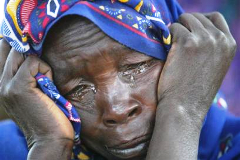Darfur: New atrocities as Security Council dithers
NEW YORK, Feb 25, 2005 (HRW) — New eyewitness accounts from Darfur of rapes, torture and mutilation by government-backed militias underscore how the U.N. Security Council must take urgent action to protect civilians and punish the perpetrators, Human Rights Watch said today.

|
|
A Sudanese refugee cries upon reaching Bahai on the Chad border, after fleeing political violence in Darfur, Sudan in July 9, 2004 (AP). |
Last week, eyewitnesses in South Darfur told Human Rights Watch how government-backed Janjaweed militia attacked villages in the Labado area in December and January, and singled out young women and girls for rape. Male relatives who protested were beaten, stripped naked, tied to trees and forced to watch the rape of the women and girls. In some cases, the men were then branded with a hot knife as a mark of their humiliation.
In violation of the April ceasefire agreement and a November 9 commitment to cease hostile aerial activity in Darfur, the Sudanese government in mid-December 2004 used Antonov aircraft, Mi-24 helicopter gunships and Janjaweed militia to attack the civilian population in the Ishma and Labado areas of South Darfur. Thousands of people were forced to flee their homes. On the outskirts of the South Darfur state capital Nyala, the sound of bombs exploding in Labado and Ishma were heard all day on December 17.
In mid-January, Sudanese government aircraft and Janjaweed forces also attacked Hamada, another village in South Darfur, reportedly killing more than 100 civilians. Both offensives appear to have targeted civilians as well as rebel bases in areas under the control of Darfur’s two main rebel movements, the Sudan Liberation Movement/Army (SLM/A) and the Justice and Equality Movement (JEM).
“The Sudanese government talks peace at the U.N., but then orders airstrikes and militia raids against its own people in Darfur,” said Peter Takirambudde, Africa director at Human Rights Watch. “The Security Council risks losing its relevance unless it finally takes meaningful steps to stop the atrocities in Darfur.”
Human Rights Watch said that the U.N. Security Council must take immediate action to protect Darfur’s civilians, who suffer ongoing atrocities while the 15 members of the Security Council stall on effective measures to end abuse.
For a third week, Security Council members are discussing a new resolution that will authorize a U.N. “peace support” force of 10,000 personnel to monitor the peace agreement ending the 21-year civil war between the Sudanese government and the main southern-based rebel movement, the Sudan People’s Liberation Army.
The draft resolution, which focuses on southern Sudan, provides little relief for civilians suffering from the armed conflict that is now devastating Darfur. The resolution would impose only travel sanctions and asset freezes on yet to be designated individuals for their involvement in human rights abuses, and extend an arms embargo on the Sudanese government’s arms shipments to Darfur.
“Increasing the international protection force in Darfur is urgently needed to stop the violence,” Takirambudde said. “The Security Council can ensure prosecution of grave crimes by referring Darfur to the International Criminal Court; this would deter the Sudanese authorities from committing even more atrocities.”
The African Union, which currently has a ceasefire monitoring force of approximately 1,800 personnel on the ground in Darfur, remains mainly based in the state capitals and larger towns of Darfur. It lacks sufficient numbers of armed troops to adequately patrol and investigate ongoing violations in the rural areas.
After the December attack in Labado, a small AU force moved into the burned and destroyed town, which allowed some civilians to return. Despite the AU presence in Labado, Janjaweed activity in the area continued as recently as February 16. Militia forces disrupted humanitarian relief efforts on the main roads by shooting at vehicles and returned to burned villages to destroy any remaining infrastructure. The Janjaweed forces were believed to be partly acting to prevent civilians from returning to their home areas.
“With so few troops in Darfur, the AU force today simply cannot protect civilians,” said Takirambudde. “The United Nations must work with the African Union to come up with a plan to vastly increase the force in Darfur.”
Human Rights Watch called on the African Union to urgently increase their deployment to the rural areas of Darfur, aggressively patrol the main roads and smaller rural villages and proactively protect civilians from the ongoing abuses, including rape, torture and murder.
Meanwhile, as the Sudanese government’s offensives in December and January, aid agencies working in South Darfur came under increasing harassment from government officials and rebel groups. In January, staff from several international non-governmental organizations were detained by government officials often based on unfounded allegations. Aid workers have also been detained by rebel movements in Darfur, most recently in mid February.
Members of the international media and human rights groups have also found it increasingly difficult to acquire visas for Sudan and Darfur, an indication of the Sudanese government’s efforts to reduce international exposure of its “ethnic cleansing” campaign in Darfur.
“The Sudanese government has long closed off regions where it’s committing massive abuses, but in Darfur last year it was forced to open its doors to media and human rights monitors,” Takirambudde said. “Now it’s trying to close that window by intimidating aid agencies and refusing visas to journalists.”
Human Rights Watch said that the largest rebel group in Darfur, the Sudan Liberation Army, has also been responsible for attacks on civilians, particularly in January around the South Darfur town of Malam. Human Rights Watch called on the rebel movements to respect civilians and civilian infrastructure and to cease attacks on humanitarian workers and convoys.
For further information, please contact:
– In Amsterdam, Leslie Lefkow (French): +31-64-876-7375
– In Washington D.C., Jemera Rone (Spanish): +1-202-368-5414 or Georgette Gagnon +1-416-893-2709
– In New York, Richard Dicker +1-212-216-1248
